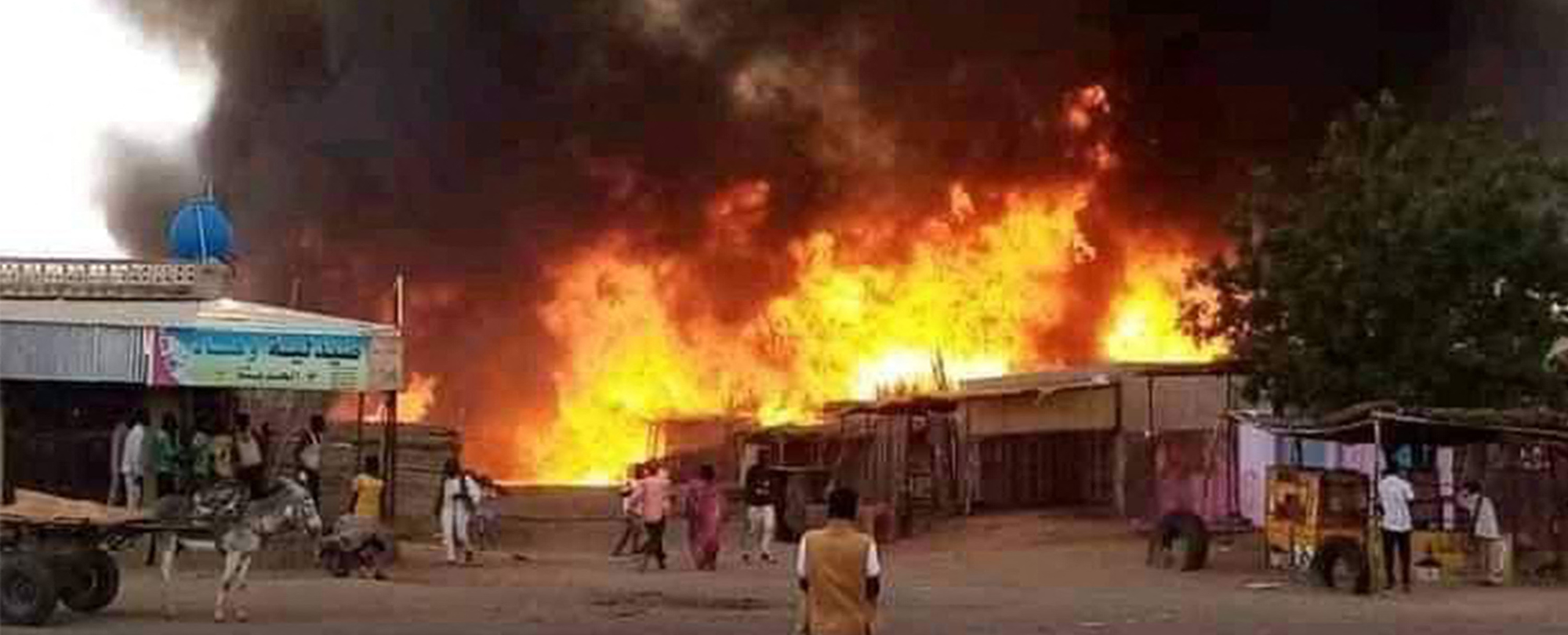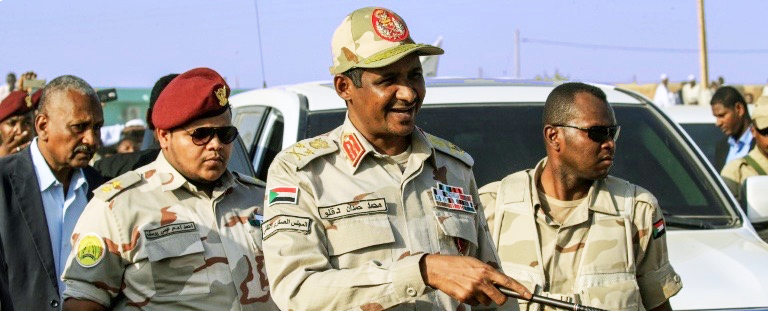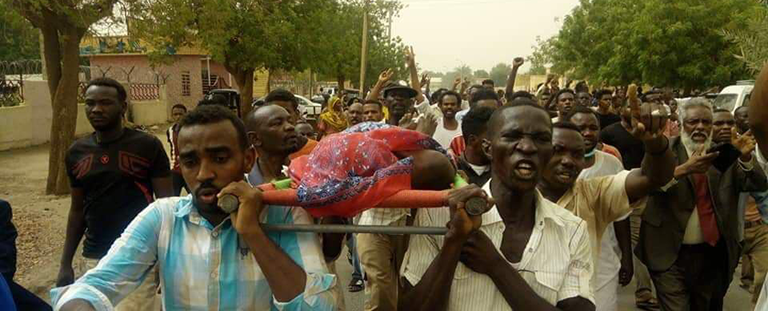
A man stands by as a fire rages in a livestock market area in al-Fasher, the capital of Sudan’s North Darfur state, in the aftermath of bombardment by the paramilitary Rapid Support Forces (RSF). (Photo: AFP)
The U.S. State Department’s January 2025 determination that the Rapid Support Forces (RSF) paramilitary force in Sudan was responsible for genocide was greeted by observers as less of a revelation than as a truism.
An investigation by a United Nations Panel of Experts a year earlier had found that the RSF has systematically violated international humanitarian law, including potentially committing war crimes and crimes against humanity. The RSF and allied Arab-militias selectively targeted African communities (largely from the Masalit ethnic group) in Darfur. In the capital of West Darfur alone, up to 15,000 people were killed.
The genocide declaration accuses the RSF of executing defenseless civilians and unarmed fighters as well as committing widespread sexual violence. The RSF is also linked to the systematic killing of men and boys of all ages, looting of the belongings of the Masalit, and seizure of their territory. An estimated 950,000 people have fled to neighboring Chad. The killings, brutalization, and depopulation of Darfur are tragic echoes from the genocide committed by the precursor of the RSF, the Janjaweed militia, in the 2000s.
There is little dispute, then, over the heinous crimes that justify the declaration.
The primary value from the genocide declaration may be to elevate the attention given to this long-neglected conflict.
Instead, the primary value from the genocide declaration may be to elevate the attention given to this long-neglected conflict in which between 60,000 and 150,000 people are estimated to have perished. Doing so—thereby shining a light on the regional actors that are sponsoring the fighting—may alter the regional political deadlock that has allowed the conflict to persist absent a popular domestic constituency.
The violence against unarmed civilians is occurring within a larger competition between two rival military structures—the RSF and the Sudan Armed Forces (SAF), the ostensible national army. While not included in the genocide declaration, SAF leader General Abdel Fattah al-Burhan was also sanctioned by the United States for committing “lethal attacks on civilians including targeting schools, markets, and hospitals,” as well as deliberately obstructing the flow of emergency assistance to millions of Sudanese. The conflict has displaced an estimated 15 million people, including 3.5 million refugees. Half of the population of 47 million need humanitarian assistance, including at least 638,000 who are at risk of famine.
Sudan’s dueling military structures are a product of the 30-year autocratic regime of Omar al-Bashir, who was deposed in a popular uprising demanding the creation of a democratic government in 2019. The military subsequently joined a transitional government with civilian leaders as part of a promised transition to full civilian rule. Before this could take place, however, al-Burhan and RSF leader General Mohamad Hamdan Dagalo, known as “Hemedti,” staged a coup in October 2021. Distrust and escalating political jockeying between the two generals sparked clashes in Khartoum in April 2023, which then quickly spread to other parts of the country.
Regional Dimensions and Drivers
The Sudan conflict is noteworthy for its strategic location. Sudan borders seven other African countries and the Red Sea, through which a quarter of the world’s seaborne container traffic travels. Sudan, thus, serves as a gateway between the Arab world and Africa. From the outset of the conflict, there were worries that Sudan’s strategic location, port access on a critical maritime throughway, fertile farmland along the Nile River, and sizeable deposits of gold would be an irresistible target for regional actors seeking to gain control of the country’s riches and establish a vassal state.
This, in fact, is the trajectory the conflict has taken. Like other proxy conflicts, such as that in Yemen and Libya, the devastation has been even more destructive than a “typical” civil war because so much outside funding and weaponry has poured into the conflict zone while the sponsors have borne none of the human costs.
Even prior to the outbreak of hostilities, Hemedti was alleged to be working with the United Arab Emirates (UAE) and Russia in trafficking gold from Sudan through Dubai. UAE companies also farm over 200,000 hectares of Sudanese land and the Emirates have plans to invest more than $6 billion in Sudan’s Abu Amama port, giving it significant control over Sudan’s trade routes. The UAE had previously recruited RSF forces to fight in Yemen against the Houthi militias.

General Mohamed Hamdan Dagalo, head of the Rapid Support Forces (RSF). (Photo: Peoplesdispatch)
Once the Sudan conflict broke out, the UAE saw in Hemedti an obvious proxy through whom the Emirates could leverage influence over a country 22 times its size. The UN Panel of Experts report links the UAE with financial and materiel support to the RSF. With the UAE funding and the RSF’s combat experience, the RSF quickly gained the upper hand in the fight for territory with the SAF. To bolster his posture as a prospective head of state while sanitizing his reputation, Hemedti undertook a high profile tour in Africa in January 2024, during which he was welcomed by heads of state from South Africa, Uganda, Djibouti, Rwanda, Ethiopia, and Kenya.
In response, the SAF was able to build its own coalition of external patrons including Egypt, Saudi Arabia, Iran, Qatar, and Türkiye. Russia, vying for naval access to Port Sudan, has at varying times supported both sides of the conflict. Reconstituted Islamist forces that were central to enforcing the repressive authority of the Bashir dictatorship have also joined the SAF coalition. With this funding, personnel, and materiel support, the SAF has been able to slowly claw back territory, including around Khartoum.
Implications of Genocide Declaration
More significant than the financial implications linked with the genocide declaration are the political costs.
More significant than the financial implications linked with the genocide declaration are the political costs. The designation undercuts the effort to burnish Hemedti’s reputation as an acceptable future leader of Sudan. In many places outside of Sudan, the declaration has had the immediate effect of making Hemedti and the RSF a pariah. The RSF had to cancel a press conference in Nairobi just a few days after the declaration.
The declaration, similarly, impacts the political calculus of the UAE. By raising the profile of the Sudan conflict, the reputational costs to the UAE of being perceived as funding genocide have increased considerably.
For a country that has invested vast resources and effort to promote its reputation as a modern, cosmopolitan oasis in the Gulf, the damage could be enormous. The Dubai International airport is the second busiest in the world and the UAE is an increasingly popular tourist destination. “Emirates” has become its own brand, augmented by its national air carrier that flies to 265 international destinations and is a sponsor of European professional football clubs, stadiums, and international sporting events. If the Emirates brand is instead linked to genocide, the costs could be greater and more long-lasting than the UAE bargained for. In perhaps a precursor of this, U.S. rapper Macklemore canceled his October 2024 show in Dubai to protest the UAE’s role in the Sudan conflict.
A reassessment by the Emirates of their support for the RSF could change the regional equation for the conflict and prospects for dialogue and a negotiated settlement. Such a reassessment could provide the basis for bringing the UAE around the table with SAF’s regional supporters. All sides would need to stop funding the belligerents in a mutually transparent manner—with the objective of assuring that none of the regional rivals will gain an upper hand in the process of de-escalation. Türkiye’s offer to serve as a mediator, to which the UAE has indicated openness, may be a step in this direction. Though, given Türkiye’s role as a SAF supporter, Ankara’s effectiveness as mediator may be tenuous.
An incentive for all regional parties to reach a deal is that the longer the conflict persists, the greater the likelihood of further fragmentation, unpredictability, and long-term regional instability—that would be costly for all.
Need for Civilian Buy-In
Negotiations must also bring representatives from Sudanese civilian coalitions to the table to build more ownership and stability for any agreement.
Involving Sudanese civilians at the center of any deal provides a third pole to negotiations, moving past the polarizing zero-sum bipolar dynamic that defines the SAF and RSF rivalry. A neutral civilian coalition may also provide a more palatable path of compromise for each military faction than allowing their rival to emerge on top.

Sudanese protesters carry protestors killed by security forces during pro-democracy marches in 2019. (Photo: Peoplesdispatch)
This applies to the SAF’s and RSF’s regional backers, as well. Avoiding a winner-takes-all outcome means no regional actor is shut out, or disadvantaged, relative to their rivals. Rather, each would be able to negotiate with recognized civilian authorities for trade, mining, and construction deals that would be created by the end of fighting. Moreover, Sudan’s experience during the post-2019 transitional period demonstrated that civilian leaders are much more likely to mobilize the large volumes of international investment the country needs to rebuild.
Having nonaligned Sudanese civilians at the center of a negotiated settlement also provides a platform for citizen interests. It is Sudanese citizens who have suffered the most from the fighting. Civilian leaders would bring a degree of legitimacy and better prospects for reconnecting the torn social fabric of the country.
It is Sudanese citizens who have suffered the most from the fighting. Civilian leaders would bring a degree of legitimacy and better prospects for reconnecting the torn social fabric of the country.
The same cannot be said for either military party, both of which are widely reviled by most of the public—for the human rights abuses against civilians, devastation they have caused the country, and for derailing the 2019 transition. To soften their image, each military faction will increasingly attempt to garner the recognition from civilian parties, though real power will still rest with the generals.
Many thorny issues would still need to be addressed in any subsequent negotiations including securing a unified Sudan, whether and how to integrate the RSF within the SAF, re-professionalizing the SAF, addressing accountability for human rights atrocities on both sides, harmonizing the positions of civilian actors, the role of Islamist political parties, and gaining control of illicit revenue streams, among others.
Nonetheless, the genocide declaration may provide a pivot to reset the conflict parameters in Sudan. This is notable in that the conflict has been locked in a political equilibrium since its early months. The opening is likely fleeting, however. Experience from other conflicts in Africa shows that they tend not to fizzle out on their own but persist. Over time, they grow more complicated with antagonists splitting into an ever-growing number of armed actors with differing chains of command, making a ceasefire and demobilization that much harder to achieve.
An earlier version of this Spotlight appeared as an article with the Italian Institute for International Political Studies (ISPI). You can read the original publication here.
Additional Resources
- Africa Center for Strategic Studies, “Sudan Conflict Straining Fragility of Its Neighbors,” Infographic, (updated) January 21, 2025.
- Rosalind Marsden, “The War in Sudan is Intensifying. Coordinated Pressure is Needed to Prevent the Country’s Fragmentation,” Chatham House, September 18, 2024.
- Laura Moncada, Amber Larsen, Andrei Kolmakov, Thomas Wanjala, and Vincent Darracq, “Final Report of the Panel of Experts on the Sudan,” United Nations Security Council S/2024/65, January 15, 2024.
- Alex de Waal, “The Revolution No One Wanted,” London Review of Books, 45, No. 10, May 18, 2023.
- Joseph Siegle, “What the Post-Coup Agreement Means for Sudan’s Democratic Transition,” Spotlight, Africa Center for Strategic Studies, November 24, 2021.
- Joseph Siegle, “The Sudanese Military’s Interests in Civilian Rule,” Tawazun, March 22, 2021.
- Africa Center for Strategic Studies, “Five Things to Watch in Sudan’s Transition,” Spotlight, April 12, 2019.
More On: Sudan Africa’s Crisis of Coups

